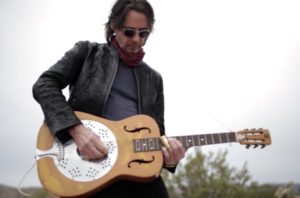Rick Springfield on Interpreting Blues for the 21st Century

Yep. Rick Springfield is that “Jessie’s Girl” guy. So why should any guitarist look to him for advice on playing blues?
My question, actually, is who wouldn’t want some creative intel from an artist who has charted some massive hits, released 19 studio albums, and typically uncorks balls-out rock riffs and solos for his albums and live performances. In fact, when you talk purely about music with Springfield, he comes off as such an obsessed guitar geek that you’d treat him as a 100-percent band dude, never suspecting he ever had a successful acting career. (Well, except that you would know that, because everyone knows that, of course, but the point being that Springfield loves guitar, guitar music, and playing guitar as much as you do.)
As far as the blues goes, I salute his knowledge of the style—as well as his enthusiasm for it—but I really love the fact he interprets the language in his own way, as he did on the brilliantly savage opus of guitar that’s all over his recent “blues album,” The Snake King [Frontiers Music].
“I wanted to do a blues-based thing,” says Springfield, “but I didn’t want to be completely bound by the stuff purists would say, such as, ‘Well, you can’t deviate from this or that or it’s not blues.’ Honestly, the blues came out of guys just playing sh*t. There were no rules for them. Sometimes they played a 13-bar blues, or an eight-bar blues, or a 50-bar blues. They just did what they needed to do to get their song out. So I thought about that, and I decided I didn’t want to restrict myself. I didn’t want to limit the appeal of the record, for one, and I also wanted to be truthful to myself, because I have a lot of pop and rock in my soul.
“For example, most everybody who does blues albums basically re-does old blues songs. I didn’t want to do that, because it has been done way better by other artists, and the originals are pretty f**king good, too. I’m also a hook whore, and I wanted people to go, ‘Hey, that’s catchy.’ And then, I had a lot I wanted to write about. So much was going on in my head, because I feel the world is just completely messed up. Evil is so prevalent, and it’s really the end for my childhood belief that there’s a benevolent god out there looking out for us. We need to do something soon, or it’s going to be over. That’s what I wanted to write about, and that’s not the kind of content that suits a pure pop album. But the blues can absolutely be about some dark sh*t. So for the album to be meaningful to me, all of this pointed to writing stuff with a blues-infused approach.”
See, this IS the guy to go to for some discussion on how to mold blues to your own personality and approach. Here’s how Springfield crafted his take on the blues.
[1] Don’t Be a Copy Cat
“I was encouraged by Eric Clapton, Jimmy Page, and others,” says Springfield, “because those talented guys listened to all of the amazing blues originators, and then they went south with it. My favorite Clapton playing is on Cream’s Disraeli Gears where he was doing that incredibly melodic stuff. He did recycle a lot of the old riffs, but he begins and ends with some amazing sh*t, and that’s what put him above the guys who were just recycling rote blues licks. And, wow, Jimmy Page took it completely somewhere else by infusing blues with eastern stuff and British Isles folk and all that.”
[2] Jettison Perceived Limitations
“I’d start out with a blues attitude, but if some other idea came along, I would go with it, and try to incorporate it in whatever blues structure I had started with. For example, ‘Little Demon’ is based around a basic rock riff, but the lyrics and the arrangement stick to the blues-infused plan. I didn’t limit myself to a strict stylistic approach.”
LISTEN TO “LITTLE DEMON”
[3] Lyrics Matter
“Your words can shape the music. When I was writing The Snake King, a few of the songs initially started out with what I’d call standard blues melodies and chord patterns. I had to come up with something more than that, because I couldn’t just sing ‘la-la’ lyrics about my baby, and hope the songs would go anywhere interesting. I had to come up with lyrics that guided the songs to an appropriate thematic direction.”
[4] Watch Out for Spectral Traffic Jams
“I like to think I create parts that don’t conflict with other parts, but just because I can write a song and know what I’m doing in the studio, it doesn’t mean I have a clue where everything needs to fit so that people can hear what’s going on. Great blues songs are emotion-based, and you don’t want a dense or confusing mix to compromise the message. Warren Huart—who mixed the album—did a great job of pulling stuff out, and even sacrificing things I thought should be featured to live underneath the mix instead. My acoustic guitars, for example, are not as loud as I thought they needed to be. But Warren managed to keep them out of the way, and yet still drive everything. That’s what great mixing is all about—knowing which parts work best to truly animate the song.”
Shush! Studio Secrets: Rick’s Tone Tools
If you’re curious about precisely what tools Springfield used to record The Snake King, well, when he’s recording at home, he might grab one of the many guitars adorning his studio walls. Yeah. It’s a feel thing. That said, he reported his main guitars for the sessions were a wooden Dobro (“It has a plunky, authentic Southern sound”), a Luna Steel Magnolia resonator, a Fender Stratocaster, a 1969 Gibson SG, and a ’60s Montgomery Ward Airline (“It’s a little piece of crap with an action so high you can’t play it as a regular guitar, but it’s a monster for slide”). He doesn’t use pedals very often, and his favorite amp is a Morgan 12-watter.





